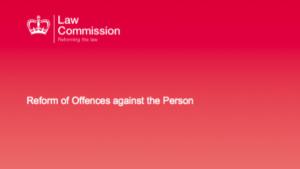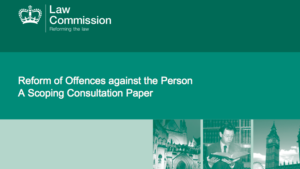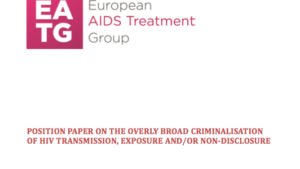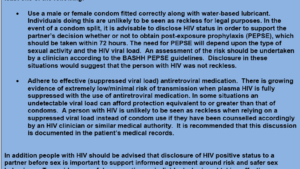Overview
Two sections of a nineteenth century general criminal law (the Offences Against the Person Act 1861) related to grievous bodily harm can be used to prosecute either ‘reckless’ (section 20) or ‘intentional’ (section 18) disease transmission in Wales. Prosecutorial guidance has established that transmission of some STIs, including HIV, amounts to grievous bodily harm. Importantly, as these offences relate to the causing of ‘grievous bodily harm’, proven transmission, and not merely ‘exposure’, is required.
The maximum penalty for reckless transmission is a prison sentence of five years for each person someone is found guilty of infecting. The maximum penalty for intentional transmission is life imprisonment. Non-UK residents can be recommended for deportation upon completion of their sentence. Whilst courts have applied Sexual Harm Prevention Orders to a small number of individuals, mandating them to disclose their HIV-positive status before engaging in sex (see below), it is not mandated to disclose one’s HIV-positive status before sex in Wales.
Several appeal court judgements, as well as regularly updated guidelines from the Crown Prosecution Service, have established that a person living with HIV can only be found guilty of HIV transmission if all of the below apply:
-
- They had sex with someone who didn’t know they had HIV (meaning that disclosure can be a defence).
- They knew they had HIV at that time (although not testing despite strong evidence they might have been infected, known as ‘wilful blindness’, is not a defence).
- They understood how HIV is transmitted and had sex anyway, or had sex with the intent to transmit HIV.
- They had sex without using ‘safeguards’, which can include either condoms or being on effective antiretroviral therapy.
- It can be proved beyond reasonable doubt that HIV was transmitted from the defendant to the complainant(s).
The latest update to the CPS guidance for England and Wales in March 2023 for the first time clearly endorsed the scientific consensus that having an undetectable viral load effectively eliminates the risk of HIV transmission (U=U), meaning that cases in which the accused’s viral load is undetectable should no longer be taken to court as the person could not be found to have been reckless about the risk of transmission.
Since the first successful prosecution in Wales, of a 20 year-old woman in 2005, there have been three other known HIV criminalisation cases, all for reckless sexual HIV transmission, the most recent taking place in Swansea in 2016.
In October 2020, a woman was charged and pled guilty to assaulting a police officer after throwing bloodstained clothes, saying they contained HIV and hepatitis. The defence argued that she had not been aiming at the sergeant but the magistrate found she had used the clothes ‘as a weapon’, and fined her 200 pounds as well as 50 pounds compensation to the officer and 85 pounds legal costs.
Laws
Offences Against The Person Act 1861
Section 18. Wounding with intent to do grievous bodily harm
Whosoever shall unlawfully and maliciously by any means whatsoever wound or cause any grievous bodily harm to any person …with intent, … to do some … grievous bodily harm to any person, [or with intent to resist or prevent the lawful apprehension or detainer of any person,] shall be guilty of an offence, and being convicted thereof shall be liable … to imprisonment for life.
Section 20. Inflicting bodily injury, with or without weapon
Whosoever shall unlawfully and maliciously wound or inflict any grievous bodily harm upon any other person, either with or without any weapon or instrument, shall be guilty of a misdemeanour, and being convicted thereof shall be liable … to imprisonment … for not more than five years.
Further resources
Information for individuals living with HIV about the law in Wales (and other UK jurisdictions).
Resources for both individuals living with HIV, as well as those advocating on their behalf, on all aspects of HIV criminalisation in Wales (and other UK jurisdictions).
A review of police handling of criminal investigations relating to transmission of HIV in England and Wales, 2005-2008. The report was used as evidence to argue for both prosecutorial and police guidance. To get a sense of its findings and impact see also the aidsmap.com coverage of the launch of the report held in the UK House of Commons in January 2009.
Explores use of the Offences Against the Person Act 1861 to prosecute people who have transmitted HIV infection to sexual partners in England, Wales and Northern Ireland. Examines evidence in cases of sexual HIV transmission and considers the likely impact that criminalising HIV transmission has on public health, especially HIV prevention. Includes recommendations.
This internal guidance from the Crown Prosecution Service (CPS) for England & Wales sets out how prosecutors should deal with cases where there is an allegation that the suspect/defendant has passed an infection to the complainant during the course of consensual sexual activity. It should be read in conjuction with the external CPS Policy for prosecuting cases involving the intentional or reckless sexual transmission of infection.









